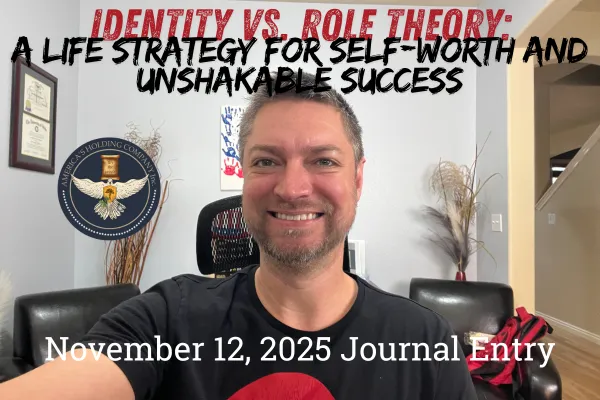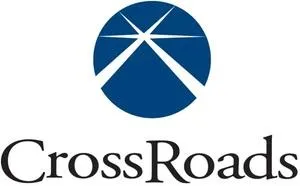The Life with Justin Stephens Blog

Identity vs. Role Theory: A Life Strategy for Self-Worth and Unshakable Success
Grok Input:
today we are going to write a life strategy post on the importance of understanding Identity and Role Theory. This theory states that you are not what you do. We all have roles that we fill on a daily basis such as father, employee, friend, golfer, blogger, and anything else that you might do. While these are all things that you might do, they are not who you are. You should not judge your self worth based on any of these roles. It is important to judge your self-worth based on your identity. Your identity is who you are intrinsically. I am an adventurer, kind, understanding, loving and helpful. These character traits are who I am as a person. They are not tied to any one role and are not things that change on a regular basis. Regardless of how I preform in a role, my identity will always be a 10 on a scale of 1 to 10 because I am a child of God and made in his image. I could preform in a role as a 4 and still have my identity as a 10 because of my belief system. If you want to succeed in life, it is important to learn to separate your identity from your role. Failing is the most important thing to learn to do in life, but failing does not make you a failure. It is a stepping stone to success. People who have learned to master this concept of identity vs role find life much easier because their value as a human is not tied to what they do, it is tied to who they are. I want to encourage everyone to try and embed this concept into their lives so they can fail without it affecting their identity. This will help you have more fun, a better attitude, more success, and be willing to try more things regardless of the outcome.
Grok Output:
Hey, Life with Justin Stephens community! Justin here, and as I navigate my WinCo manager training, handyman gigs, and AHC vision, today's Life Strategy post is about a game-changer: Identity and Role Theory. We all juggle roles—father, employee, blogger—but are you tying your worth to them? Spoiler: Don't. This theory reminds us we're not what we do; we're who we are. From my experiences (failing at hustles but staying grounded), separating identity from role unlocks freedom. Let's break it down.
What Is Identity and Role Theory?
Identity and Role Theory states that you are not what you do. We all have roles we fill daily—father, employee, friend, golfer, blogger—and anything else you might do. While these are all things that you might do, they are not who you are. You should not judge your self-worth based on any of these roles. It is important to judge your self-worth based on your identity. Your identity is who you are intrinsically. I am an adventurer, kind, understanding, loving, and helpful. These character traits are who I am as a person. They are not tied to any one role and are not things that change on a regular basis. Regardless of how I perform in a role, my identity will always be a 10 on a scale of 1 to 10 because I am a child of God and made in his image. I could perform in a role as a 4 and still have my identity as a 10 because of my belief system. If you want to succeed in life, it is important to learn to separate your identity from your role. Failing is the most important thing to learn to do in life, but failing does not make you a failure. It is a stepping stone to success. People who have learned to master this concept of identity vs. role find life much easier because their value as a human is not tied to what they do; it is tied to who they are.
Step 1: Identify Your Core Traits – Anchor Your Worth
List 5–10 intrinsic qualities (e.g., resilient, creative). Mine: Adventurous, faithful. These are unchanging—your "10/10" foundation. Role performance (e.g., a bad WinCo shift) doesn't touch them. Tip: Journal weekly: "Who am I beyond my roles?"—reinforces unshakeable self-worth.
Step 2: Audit Roles – Detach Worth from Performance
Map your roles (father, manager, blogger) and rate recent "performance." Notice how low scores sting—detach by affirming identity first. In my handyman fails, I remind myself: "I'm a learner, not a failure." Tip: Visualize roles as hats—wear them, but don't let them define you.
Step 3: Embrace Failure as Feedback – Step to Success
Failing in a role (e.g., missed blog deadline) is data, not destiny. Master this: Reframe "I failed" to "This role didn't go as planned—my identity is intact." It's freed me to experiment with AHC without fear. Tip: Post-fail, ask: "What did this teach my adventurer self?"
Step 4: Embed It Daily – Fun, Attitude, and Willingness
Embed the theory: Morning affirmation ("My identity is 10/10"), evening review (roles vs. traits). This boosts fun (try new things), attitude (less self-judgment), success (persistent action), and willingness (fearless risks). My 2+ years of blogging? Role dips didn't kill the mission.
Reflections: Freedom in Identity
Separating identity from role has lightened my load—WinCo "wins" are bonuses, not my worth. It's unshakable confidence for life's adventures.
Why This Matters for Your Journey
Identity anchors resilience—in finance (worth beyond balances), business (failures as steps), and life (joy in roles, not tied to them). Master it for unshakeable success.
At Life with Justin Stephens, we deliver actionable Life Strategy like this, alongside Journal Entries, Point of View stories, Resources, and Great Causes for your finance, business, sales, marketing, and life goals.
Call to Action: Subscribe at justindcstephens.com for daily tips. Share your identity trait, and comment: What's one role you're detaching from?
P.S. Tomorrow, a Journal Entries post on life updates. Stay tuned!
To your success,
Justin Stephens















